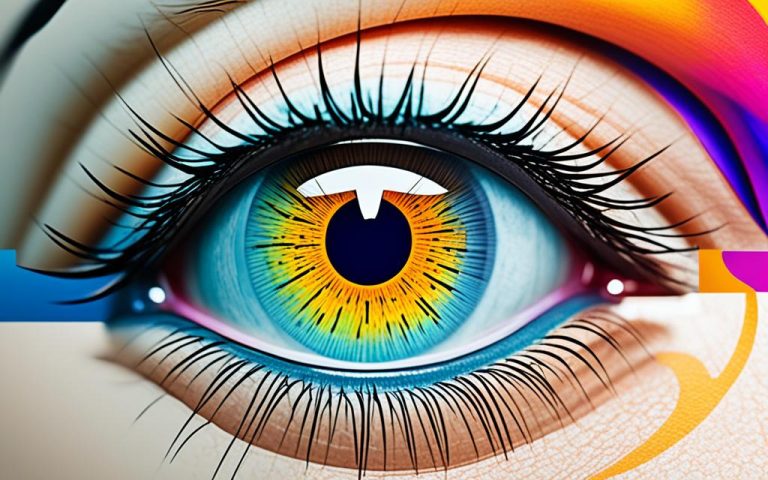Discover Essential Mental Health Insights Today
Mental health is a big part of our lives. It shapes how we think, feel, and act every day. In the United States, more than 1 in 5 adults deal with a mental illness1. This shows we need to know more about mental health issues.
The world’s mental health scene is always changing. From 2007 to 2017, the number of people with mental illness and substance abuse went up by 13%2. This tells us mental health insights are more important than ever in our busy lives.
Stress can lead to the release of cortisol and adrenaline. These hormones cause anxiety, depression, heart problems, weight gain, and trouble sleeping1. Knowing this helps us find ways to handle our mental health better.
Being emotionally smart is key to staying mentally well. It helps you control your feelings and understand others’. With over a 25% jump in anxiety and depression worldwide during the COVID-19 pandemic2, this skill is more vital than ever.
Key Takeaways
- Mental health affects a significant portion of the population
- Global mental health issues are on the rise
- Chronic stress has wide-ranging health impacts
- Emotional intelligence is crucial for mental well-being
- The pandemic has significantly increased anxiety and depression rates
Understanding Mental Health: A Comprehensive Overview
Mental health is key to our overall well-being. It shapes how we think, feel, and act every day. Let’s explore what mental health means, clear up myths, and see why it’s so important.
Defining Mental Health and Well-being
Mental health is more than just being free from mental illness. The World Health Organization says health is “a state of complete physical, mental, and social well-being.”3 This shows mental health is a big part of our health. It lets us handle life’s ups and downs, work well, and help our communities.

Galderisi et al. give a deeper look at mental health. They say it’s a state of balance inside us. This balance lets us use our skills in line with what society values. It includes thinking well, feeling emotions, and dealing with tough times3.
Debunking Common Myths About Mental Health
Many think mental health issues are rare. But, nearly one-in-five adults face a mental illness, says the National Institute of Mental Health4. Another wrong idea is that mental health problems show weakness. But, they can hit anyone, no matter their age, gender, or background.
The Importance of Addressing Mental Health
It’s vital to tackle mental health for many reasons. It boosts resilience, emotional smarts, and life quality. Being mentally healthy means feeling good, having strong self-esteem, and being able to handle stress and solve problems3.
Putting mental health first helps you have better relationships, make smarter choices, and reach your goals clearer. Managing it often means getting help, taking care of yourself, and having support from those close to you4.
The Impact of Mental Health on Daily Life
Mental health is key to how we live our lives. It shapes how we connect with others, do our jobs, and enjoy life. In the U.S., over one in five adults deal with a mental disorder5.
People with serious mental health issues often find it hard to live a good life and connect with others. A study in Ethiopia found that those with mood disorders face big challenges in their daily life6.
Research shows that being emotionally smart helps with well-being. It helps you handle stress, work better, and get along with people. This is crucial since many mental health problems start young, often by age 14 or 245.
“Mental health is not a destination, but a process. It’s about how you drive, not where you’re going.” – Noam Shpancer, PhD
Mental health affects us all. A huge 90% of Americans think the U.S. is facing a mental health crisis7. This shows we need better support and resources for mental health in our communities.
| Mental Health Status | Illicit Drug Use in Past Year |
|---|---|
| Serious Mental Illness | 52.9% |
| Any Mental Illness | 43.9% |
| No Mental Illness | 20.6% |
This data shows how mental health and substance use are linked7. Focusing on mental health could lead to fewer risky behaviors and a better life.
Recognizing Common Mental Health Challenges
Mental health challenges touch millions of Americans. It’s key to understand these issues early for better management. Let’s look at some common mental health challenges and how they affect daily life.
Stress and Its Effects
Stress is a big issue that can hurt your mental health. It makes you feel overwhelmed and tired. If not handled, chronic stress can lead to worse mental health problems.
Anxiety Disorders
Anxiety disorders make you worry too much and fear things that shouldn’t scare you. They affect a lot of people, with over 1 in 5 US adults having a mental illness8. Spotting anxiety early helps with better treatment.
Depression
Depression is a serious mood disorder that changes your thoughts, feelings, and actions. It’s not just feeling sad; it can make you feel hopeless and lose interest in things. About 1 in 25 U.S. adults has a serious mental illness like major depression8.
Burnout
Burnout is feeling physically and emotionally drained, often from work stress. It can hurt your work and life quality. Spotting burnout early helps stop it from getting worse.
Acting early is key to handling mental health challenges. Studies show that half of mental illnesses start by age 14, and 3/4 by age 249. Understanding and coping with these issues can greatly improve outcomes.
| Mental Health Challenge | Key Symptoms | Prevalence |
|---|---|---|
| Stress | Overwhelm, fatigue | Widespread |
| Anxiety Disorders | Excessive worry, fear | Over 1 in 5 adults |
| Depression | Persistent sadness, loss of interest | About 1 in 25 adults (severe cases) |
| Burnout | Chronic exhaustion, reduced productivity | Common in work environments |
Mental health challenges can hit anyone, no matter your age, gender, or background. Spotting them early and getting help is vital for managing them well.
The Role of Lifestyle in Mental Well-being
Your daily habits greatly affect your mental health. Studies show that the choices you make in your life can really impact your mental wellness. For example, a study found that 58.3% of teenage girls had healthy habits, but only 6.7% had unhealthy ones10.
Research highlights a strong connection between your lifestyle and your mental health. It showed that 52.5% of girls felt depressed, with some feeling very badly10. Anxiety was also a big issue, with many girls feeling either moderate or severe anxiety10.
Things like what you eat, how active you are, and how you handle stress are important for your mental health. The Simple Lifestyle Indicator Questionnaire (SLIQ) looks at these things to give a full picture of your lifestyle10. A healthy lifestyle is linked to better mental health, as a 2022 study found11.
To get better mental health, try these tips:
- Engage in regular physical activity
- Maintain a balanced diet
- Practice stress-reduction techniques
- Ensure adequate sleep
- Limit alcohol and avoid smoking
By making these lifestyle changes, you can really boost your mental health. Remember, even small steps can make a big difference in how you feel overall.
Mental Health Insights: Strategies for Emotional Intelligence
Emotional intelligence is key to good mental health. It means knowing and handling your feelings well.
It’s about being good at handling emotions and making smart choices. This includes feeling, seeing, saying, understanding, and controlling emotions12. Now, companies look for emotional smarts as much as tech skills in job seekers13.
There are four main parts to emotional intelligence: knowing yourself, managing yourself, knowing others, and building relationships12. Working on these areas can make you more self-aware, improve your relationships, and help you cope better.
Here are ways to get better at emotional intelligence:
- Practicing self-reflection
- Actively listening to others
- Learning to control your feelings in tough times
- Mindfulness to get better at feeling your emotions
- Working with therapists
- Asking for feedback
- Seeing things from different angles
Being emotionally smart can help you do well in your job and build stronger relationships. It also makes you feel less alone and more connected13. These skills make you happier and more satisfied with life.
Studies show that too much stress can cause serious health issues like anxiety and depression. Handling stress is key to growing emotional intelligence13. By getting better at emotional intelligence, you can make smarter choices and handle social situations better.
“Emotional intelligence is the ability to sense, understand, and effectively apply the power and acuity of emotions as a source of human energy, information, connection, and influence.” – Robert K. Cooper
Remember, you can learn emotional intelligence skills anytime. With effort and commitment, you can boost your emotional smarts and better your mental health.
The Power of Mindfulness and Meditation
Mindfulness and meditation are great for your mental health. They are becoming more popular as ways to improve your mental wellness. These practices offer many benefits for your overall well-being.
Understanding Mindfulness Practices
Mindfulness means focusing on the now without judging it. It helps you handle your thoughts and feelings by making you more aware of them. This can make you better at understanding emotions, paying attention, focusing, and building relationships14.
Here are some mindfulness practices you can do every day:
- Breathing exercises
- Body scans
- Mindful walking
- Mindful eating
- Mindful listening
Benefits of Regular Meditation
Mediation can lower stress, boost focus, and help with emotional control. Studies show that it can make you feel happier and less anxious15. It also improves your memory and how flexible you think15.
| Benefit | Description |
|---|---|
| Stress Reduction | Decreases anxiety and somatic distress |
| Emotional Regulation | Improves positive affect and reduces negative affect |
| Cognitive Function | Enhances working memory and cognitive flexibility |
| Relationship Satisfaction | Helps respond well to relationship stress |
Incorporating Mindfulness into Daily Routine
You can easily add mindfulness to your daily life. Simple practices like breathing exercises or body scans can fit into your day14. Programs like Mindfulness-Based Stress Reduction (MBSR) and Mindfulness-Based Cognitive Therapy (MBCT) offer structured skills to boost mental health14.
Studies show that mindfulness training helps with self-control and changing health behaviors in primary care patients16. By practicing mindfulness regularly, you can better manage stress and emotions151416.
Cognitive Behavioral Therapy: A Proven Approach
Cognitive behavioral therapy (CBT) is a strong tool for tackling mental health issues. It changes negative thoughts and actions, leading to better well-being. CBT works well for many conditions, like anxiety and depression, giving valuable insights into mental health.
Recent studies show how effective CBT is. A big study looked at 409 trials with over 52,000 patients. It found CBT was as good as or better than medication for depression over time17. Another study reviewed 345 articles and found CBT helped with anxiety, depression, and more17.
CBT isn’t just for mental health. It helps with fibromyalgia, work stress, and physical symptoms in workers18. It’s also affordable and can be done online, making it easier for more people to try18.
“CBT equips you with practical tools to navigate life’s challenges, fostering resilience and promoting lasting positive change.”
CBT is great for many things. A big review of 106 studies showed it’s really good for anxiety, eating disorders, anger issues, and stress17. It also helps with addiction, quitting smoking, and gambling19.
By using CBT, you can learn to handle tough situations better. It improves your problem-solving and builds resilience. This approach lets you take charge of your mental health, leading to a better life.
Building Resilience: Key to Mental Strength
Resilience means bouncing back from tough times. It’s not just for a few, but a skill we can all learn. Many Americans showed resilience after the 9/11 attacks20.
Understanding Resilience
Being resilient means handling hard times well. It’s not about avoiding pain but learning to deal with it. People who bounce back often face tough emotions, showing resilience is a journey20.
Techniques for Developing Resilience
To build resilience, focus on four key areas:
- Connection: Build strong relationships and join supportive communities
- Wellness: Practice self-care through nutrition, sleep, and exercise
- Healthy thinking: Engage in mindfulness and positive behaviors
- Meaning: Set realistic goals and seek opportunities for growth
These strategies help you handle stress and lessen emotional pain20. Research shows it’s vital to teach resilience in kids and teens for lifelong mental health21.
The Impact of Resilience on Mental Health
Resilience is key for good mental health. Studies show it’s linked to better mental health in clinical settings21. Those who are resilient cope better, leading to happier lives.
“Resilience is not about eliminating stress or erasing life’s difficulties. Instead, it’s about giving yourself the skills and tools to manage the inevitable challenges of life.”
If building resilience is hard for you, it’s okay to get help. A mental health professional can offer personalized advice to boost your mental wellness and resilience20.
Stress Management Techniques for Better Mental Health
Stress can really affect your mental health. It’s important to learn how to manage stress well. In the UK, 20.1% of workers work over 45 hours a week, leading to burnout and stress22. Let’s look at some easy ways to handle stress and boost your mental health.
Exercise is great for reducing stress. It makes you feel happy and gives you more energy. Try to add physical activity to your daily life. You can walk during your lunch break, use the stairs, or dance to your favorite songs23.
Relaxation techniques can soothe your mind and body. Try deep breathing, progressive muscle relaxation, or yoga. These can lower anxiety and make you feel peaceful. Everyone is different, so try a few to see what works for you23.
Good time management can help reduce work stress. Focus on what’s important, set achievable goals, and don’t take on too much. Bad time management can make stress worse. Keep calm and organized by planning your day well23.
Make time for hobbies and fun activities to help you relax. This could be reading, gardening, painting, or anything that makes you happy. Remember, taking breaks is good for your mental health.
“The greatest weapon against stress is our ability to choose one thought over another.” – William James
Avoid using alcohol or drugs to cope with stress, as they can make things worse22. Instead, eat well to keep your mind healthy. A balanced diet gives you the brain nutrients you need22.
Using these stress management tips can really help your mental health and life quality. It’s okay to get help from professionals if stress is too much.
The Connection Between Physical and Mental Health
Your physical and mental health are closely linked. This link is key to a complete view of health. New studies show how exercise affects your mood and stress levels.
Exercise is key for feeling good and handling stress. Doing 150-300 minutes of moderate exercise a week, plus muscle-strengthening activities, can boost your mental health24. It helps your muscles, boosts your metabolism, and strengthens your immune system, all helping your mental health24.
What you eat is also important for your mental health. Eating five fruits and veggies a day and drinking enough water helps your health, including your mind24. These foods support your brain and help you feel emotionally stable.
Getting enough sleep is crucial for your mental health. Good sleep helps your brain and emotions stay in check. Bad sleep can make you feel stressed and anxious, showing why good sleep habits matter.
Studies show that mental health issues can affect your physical health. Depression, for example, can increase the risk of stroke, diabetes, and heart disease25. People with chronic physical conditions like diabetes or heart disease are more likely to have mental health issues like anxiety and depression25.
Mindfulness can connect physical and mental health. Just a few minutes of self-reflection each day can lower stress and improve your mental health24. Yoga and meditation can help manage symptoms of mental health problems26.
Understanding the link between physical and mental health helps you take care of both. This knowledge lets you make choices that help your body and mind. It leads to a healthier, more balanced life.
Fostering Positive Relationships for Mental Well-being
Positive relationships are key for your mental health and emotional smarts. They create a strong support network. This helps you deal with life’s ups and downs and grow as a person.
The Impact of Social Connections on Mental Health
Having strong social ties boosts your overall health. They cut down stress, make you more resilient, and lead to a better life. Studies show that those with big social circles have less depression, anxiety, and stress27.
Today, we often swap face-to-face chats for online talks. This can make us feel lonely and isolated28. To fight this, focus on building healthy relationships. This will make you feel better and give you a sense of belonging28.
Building and Maintaining Healthy Relationships
Creating good relationships means talking well and respecting each other. Being mentally healthy helps you share your feelings and thoughts. But stress and anxiety can make it hard29. To make your relationships better, take care of yourself, think about seeing a therapist, and talk openly about your mental health29.
Staying active and eating well are good for your mind and your relationships29. These steps can make your communication, empathy, and emotional bonds stronger29.
Addressing Toxic Relationships
Spot and fix toxic relationships that hurt your mental health. Bad mental health can make you hard to connect with in relationships29. If you’re having trouble, think about getting help from a therapist or counselor29.
Good relationships help you learn about yourself and grow28. By building strong connections and feeling like you belong, you create a place where you’re valued. Here, you can be yourself28.
| Aspect | Impact on Mental Well-being | Strategies for Improvement |
|---|---|---|
| Social Connections | Reduce stress, enhance resilience | Prioritize face-to-face interactions |
| Communication | Express thoughts and emotions effectively | Practice active listening, empathy |
| Self-care | Improve relationship quality | Regular exercise, balanced diet |
| Professional Help | Manage relationship conflicts | Seek therapy or counseling when needed |
Seeking Professional Help: When and How
Knowing when to get help is key for mental health. In the U.S., about 19% of adults face mental health issues, impacting over 47 million people30. This shows how vital it is to get support and analysis.
If you’re feeling down for a long time, losing interest in things you used to love, or having trouble sleeping or eating, you might need help31. Signs like these, along with using more substances or thinking about harming yourself, are red flags.
During tough times, like the COVID-19 pandemic, it’s more important than ever to seek help. Many people have delayed or stopped getting mental health support during this time32. Don’t let anything stop you from getting the help you deserve.
“Seeking help is a sign of strength, not weakness.”
When you’re ready to get help, here are some options:
- Therapists
- Psychologists
- Psychiatrists
- Support groups
Getting professional help can lower the risk of other health problems, improve your relationships, and help you cope better30. It’s a crucial step for your mental and overall health.
| Service | Description |
|---|---|
| National Suicide Prevention Lifeline | 24/7 crisis support |
| Alcoholics Anonymous (AA) | Support for alcohol addiction |
| Narcotics Anonymous (NA) | Support for drug addiction |
| Substance Abuse and Mental Health Services | Comprehensive mental health support |
By asking for help, you’re putting your mental health first and opening the door to a better life. Don’t wait to reach out when you need it.
Mental Health Awareness: Breaking the Stigma
In today’s fast-paced world, mental health awareness is key. In the US, about 1 in 5 adults has a mental illness33. We need more understanding and support. Breaking the stigma around mental health helps people seek help.
The Women’s Center has helped the community for 50 years34. Events like Mental Health Awareness Month, supported by KPMG, educate the public and fight discrimination34.
Signs of mental health issues include sudden changes in substance use, social withdrawal, trouble focusing, more anxiety, and suicidal thoughts34. Spotting these signs early helps with support and treatment.
- Join community events focused on mental health
- Share correct info on social media
- Support friends and family with mental health issues
It’s important to remove barriers to mental health care. Cost and privacy concerns stop some from getting help34. Internal barriers need special methods like motivational interviewing34.
Open talks and awareness help us fight mental health stigma34. Remember, asking for help is strong, not weak. If you need help, reach out to experts or groups like The Women’s Center or NAMI for advice and resources34.
Conclusion
Mental health insights are key to understanding our mental well-being. They play a big role in clinical psychiatry and help diagnose mental health issues35. Knowing these insights helps you navigate your mental health better.
Using good mental wellness strategies is important for staying mentally healthy. Studies show that people with good insight and less stigma do better35. It’s important to work on reducing stigma to improve mental health.
Mental health is connected to many life factors. Research links mental health to physical health and quality of life36. Your mental health affects how happy you are with life. So, it’s key to take care of yourself and get help when you need it.
Keep learning about new research and strategies as you work on your mental health. Studies are looking into how the brain and psychology help us understand mental health35. By keeping up with these studies, you can make better choices for your mental wellness and live a happier life.
FAQ
What is mental health?
Mental health is more than just being free from mental illness. It’s about feeling good and being able to handle life’s ups and downs. It’s about thinking, feeling, and acting in ways that let us live fully.
Why is addressing mental health important?
It’s key because it makes us stronger, more emotionally smart, and happier. It helps us talk better, feel for others, and make strong connections. It also boosts our creativity and problem-solving skills.
What are some common mental health challenges?
Many people face stress, anxiety, depression, and burnout. It’s important to know these issues and get help to feel better and stay well.
How can lifestyle factors impact mental health?
Things like spending time in nature, eating well, writing in a journal, saying positive things to ourselves, and setting goals can make us feel better.
What is emotional intelligence and why is it important for mental health?
Emotional intelligence means understanding and handling our feelings well. It makes us more aware of ourselves and others, builds better relationships, and helps us cope with tough times.
What are the benefits of mindfulness and meditation?
These practices can lower stress, help us focus, and manage our feelings better. They also improve sleep, boost self-awareness, and make us feel mentally healthier.
What is Cognitive Behavioral Therapy (CBT)?
CBT is a proven way to change negative thoughts and actions. It helps with anxiety, depression, and other mental health issues by teaching new ways to cope and solve problems.
What is resilience and why is it important for mental health?
Resilience is bouncing back after hard times. People who are resilient handle stress better and tend to be happier and more satisfied with life.
What are some effective stress management techniques?
Good ways to manage stress include exercising, relaxing with deep breathing or yoga, planning your time well, and enjoying hobbies.
How are physical and mental health connected?
They’re very connected. Staying active, eating right, and sleeping well help our brains work better and keep us mentally healthy. On the other hand, poor physical health can hurt our mental well-being.
Why are positive relationships important for mental well-being?
They offer support, cut down stress, and make life more enjoyable. Having good friends and family is key to staying mentally healthy over time.
When should someone seek professional help for mental health concerns?
If you feel sad or anxious a lot, can’t do daily tasks, or think about harming yourself, you might need help. Experts like therapists and psychiatrists can offer the right care and support.
How can we break the stigma surrounding mental health?
We can fight stigma with events like Mental Health Awareness Month, sharing personal stories, spreading correct info, and supporting mental health policies. These actions educate people, reduce bias, and create a supportive environment.
Source Links
- https://insights.sca.health/insight/article/exploring-the-mind-body-connection-exercise-and-mental-health – Exploring the Mind-Body Connection: Exercise and Mental Health
- https://www2.deloitte.com/us/en/insights/industry/public-sector/mental-health-equity-and-creating-an-accessible-system.html – A human-centered vision for improving the mental health care ecosystem
- https://www.ncbi.nlm.nih.gov/pmc/articles/PMC10911315/ – Concept of mental health and mental well-being, it’s determinants and coping strategies
- https://www.samhsa.gov/mental-health – What is Mental Health?
- https://www.psychiatry.org/patients-families/what-is-mental-illness – What is Mental Illness?
- https://www.ncbi.nlm.nih.gov/pmc/articles/PMC9978447/ – Health related quality of life among people with mental illness: The role of socio-clinical characteristics and level of functional disability
- https://publichealth.tulane.edu/blog/mental-health-public-health/ – Understanding Mental Health as a Public Health Issue
- https://www.cdc.gov/mentalhealth/learn/index.htm – About Mental Health
- https://www.psychiatry.org/patients-families/warning-signs-of-mental-illness – Warning Signs of Mental Illness
- https://www.ncbi.nlm.nih.gov/pmc/articles/PMC10771855/ – The Impact of a Healthy Lifestyle on Psychological Well-Being Among Saudi Adolescent Girls Attending Secondary Schools in Taif City, Saudi Arabia
- https://www.ncbi.nlm.nih.gov/pmc/articles/PMC10327438/ – Associations of lifestyle with mental health and well-being in Chinese adults: a nationwide study
- https://www.layla.care/post/a-journey-into-emotional-intelligence-insights-and-strategies – Blog | Layla Care
- https://www.helpguide.org/mental-health/wellbeing/emotional-intelligence-eq – Improving Emotional Intelligence (EQ): Expert Guide
- https://www.mentalhealth.org.uk/explore-mental-health/publications/how-look-after-your-mental-health-using-mindfulness – How to look after your mental health using mindfulness
- https://www.apa.org/monitor/2012/07-08/ce-corner – What are the benefits of mindfulness?
- https://www.ncbi.nlm.nih.gov/pmc/articles/PMC7647439/ – Mindfulness and Behavior Change
- https://www.psychologytoday.com/us/blog/the-addiction-connection/202307/new-insights-into-the-power-of-cbt-therapy – New Insights Into the Power of CBT Therapy
- https://www.ncbi.nlm.nih.gov/pmc/articles/PMC8489050/ – Cognitive–behavioral therapy for management of mental health and stress-related disorders: Recent advances in techniques and technologies
- https://www.ncbi.nlm.nih.gov/pmc/articles/PMC3584580/ – The Efficacy of Cognitive Behavioral Therapy: A Review of Meta-analyses
- https://www.apa.org/topics/resilience/building-your-resilience – Building your resilience
- https://www.ncbi.nlm.nih.gov/pmc/articles/PMC3746114/ – Resilience in mental health: linking psychological and neurobiological perspectives
- https://www.mentalhealth.org.uk/explore-mental-health/publications/how-manage-and-reduce-stress – How to manage and reduce stress
- https://www.helpguide.org/mental-health/stress/stress-management – Stress Management: Techniques & Strategies to Deal with Stress
- https://www.verywellmind.com/the-mental-and-physical-health-connection-7255857 – The Connection Between Mental Health and Physical Health
- https://www.rgare.com/knowledge-center/article/the-connection-between-physical-and-mental-health-an-overview – The Connection Between Physical and Mental Health: An Overview
- https://www.ncbi.nlm.nih.gov/pmc/articles/PMC9902068/ – Role of Physical Activity on Mental Health and Well-Being: A Review
- https://www.thenewhopemhcs.com/the-role-of-social-connections-in-mental-wellness/ – The Role of Social Connections in Mental Wellness
- https://oaksintcare.org/building-healthy-relationships-for-mental-wellness/ – The Power of Connection: Building Healthy Relationships for Mental Wellness – Oaks Integrated Care
- https://www.eastcoasttelepsychiatry.com/the-role-of-mental-health-in-building-healthy-relationships/ – Mental Health: The Role in Building Better, Healthy Relat…
- https://www.betterup.com/blog/seeking-help – Seeking Help for Your Mental Health Is Brave. And Beneficial
- https://www.forbes.com/health/mind/professional-mental-help/ – 4 Signs It May Be Time To Seek Professional Mental Health Help
- https://www.ncbi.nlm.nih.gov/pmc/articles/PMC9684094/ – Help-seeking behaviors for mental health problems during the COVID-19 pandemic: A systematic review
- https://stellishealth.com/promoting-mental-health-awareness-breaking-the-stigma/ – Promoting Mental Health Awareness: Breaking the Stigma
- https://thewomenscenter.org/2024/05/14/breaking-down-stigma-mham-2024/ – Breaking Down Stigma: The Importance of Mental Health Awareness – The Women’s Center
- https://www.ncbi.nlm.nih.gov/pmc/articles/PMC4649806/ – Insight and Psychosis
- https://www.ncbi.nlm.nih.gov/pmc/articles/PMC9360426/ – Mental Health Prevention and Promotion—A Narrative Review







